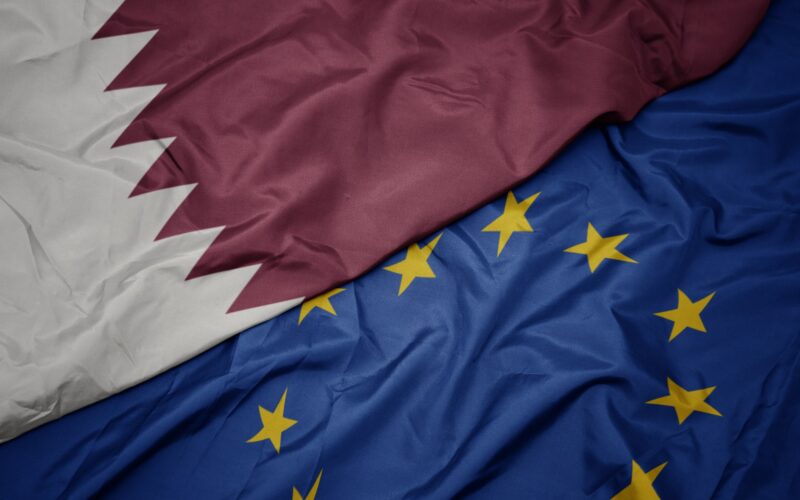Members of the European Parliament (MEP) are looking into an agreement between the European Union (EU) and Qatar aimed at ensuring fair competition and a platform for future cooperation. Negotiations finished in 2019 and the agreement was finalized in October 2021.
However, the agreement is now under investigation in the European Parliament (EP) after the federal prosecutor’s office in Belgium took six individuals in for questioning and charged four with money laundering, corruption, and participating in a criminal organization.
While the office did not identify either the politicians or the country, on December 13, 2022, MEPs voted to remove Eva Kaili, from Greece, from her role as one of the Vice Presidents of the EP. In response, her lawyer told local Belgian media that she “has nothing to do with bribery from Qatar”.
The arrests occurred on December 9, 2022.
The fact that a probe was initiated was disclosed by Politico, after obtaining an email from Karima Delli, the chair of the EP’s Committee on Transport and Tourism.
“Given the recent developments, granting the consent to this agreement at this stage could be difficult until it is established that conditions were transparent and unbiased,” she said in an email to other MEPs on the committee. The French MEP from the Greens/European Free Alliance aimed to seek guidance from the European Commission (EC) to gain information “about the ongoing ratification process of the EU-Qatar Air Agreement and to know when the consent procedure is expected to start.”
Fair(er) skies between the EU and Qatar
The agreement was described as “landmark” because it was also the first to take place between the EU and any of the Gulf States.
At the time, Adina Vălean, the Commissioner for Transport, noted that the agreement between the two parties was “a global benchmark or forward-looking aviation agreements.”
“It is testimony to our shared commitment to economically, socially, and environmentally sustainable aviation, based on a modern framework covering fair competition and closer cooperation on social and environmental matters. This agreement will bring new opportunities, more choice, and higher standards for passengers, industry, and aviation workers,” she added.
It was an extension of already-present bilateral air transport treaties that have liberalized travel between the EU member states and the Gulf State. As the European Commission (EC) pointed out, however, “none of these agreements cover fair competition, financial transparency, the environment or social issues, which are critical for improving the sustainability of aviation and for ensuring a level playing field”. As such, individual member states’ treaties were replaced by the agreement finalized in October 2021.
“The signature of this historic Aviation Agreement will bring together industry stakeholders, creating new opportunities for synergies to develop the aviation sector. Based on what we have achieved in the past, I am convinced that Qatar Airways will continue to play an ever-increasing role in the further development of the European air transport industry,” Akbar Al Baker, Qatar Airways Chief Executive, stated at the time.
At the beginning of the agreement, while third and fourth freedom rights were open between the EU and Qatar, traffic was limited for flights between Belgium, Germany, France, Italy, and the Netherlands, which were gradually opened up starting with the International Air Transport Association’s (IATA) 2021/2022 Winter Season. The season began on October 30, 2021, and went on until March 26, 2022.
Criticizing the aviation agreement
When the negotiations concluded in 2019, though the agreement could not be enforced due to a conflict between the United Kingdom (UK) and Spain over the airport in Gibraltar, questions regarding why was the “EU so eager to cuts deals that undervalue its own aviation market” were raised.
These were the words of Jon Horne, the President of the European Cockpit Association (ECA), who spoke out in the light of the ending of negotiations in March 2019.
“Qatar has a reputation of ignoring fundamental labor rights, not recognizing unions or collective bargaining. It is unlikely that any ‘social clause’ – even if it includes ironclad social guarantees – would work out such large differences,” Horne continued.
One of the main criticisms associated with the decision to give Qatar the World Cup was its labor practices, including the numerous deaths of migrants. The EP adopted a resolution on the situation in the country in November 2022, indicating that “hundreds of thousands of migrant workers still face discriminatory laws and practices in Qatar and called on Qatar to fully implement its new legislation to protect workers’ rights”.
“We are worlds apart when it comes to labor rights and employment conditions,” Horne concluded.
Still, Kaili, the now-ex-Vice President of EP, praised Qatar and the fact that the World Cup in Qatar was “proof, actually, of how sports diplomacy can achieve a historical transformation of a country with reforms that inspired the Arab world,” she said during a debate in the EP on November 21, 2022.
“I have been lectured as a Greek and I remind us all that we have thousands of deaths because of our failure for legal ways of migration in Europe. We can promote our values, but we do not have the moral right for lectures to get cheap media attention,” she continued.
There was already a precedent to criticize Gulf States’ airlines, including Qatar Airways. Three major carriers in the United States (US), namely American Airlines, Delta Air Lines, and United Airlines, claimed that United Arab Emirates (UAE)-based Emirates, Etihad Airways, and the aforementioned Qatari airline were receiving illegal state subsidies, which is why open skies agreements with the two countries must be looked at again, according to their effort at the time in 2015.
The conflict has escalated and de-escalated over time. While Emirates proudly stated that they are fully transparent with its annual financial reports going back as far as 1993, Etihad Airways and Qatar Airways were forced to invite everyone to view their financials in order to solve the spat in 2018.

